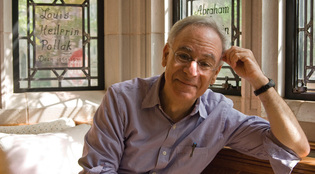 loading
loading
Light & VerityNew law dean learning the ropes Mark Zurolo ’01MFARobert C. Post ’77JD took over as dean of the law school after Harold Hongju Koh joined the State Department. View full imageRobert C. Post ’77JD vaulted into office as the new dean of Yale Law School on July 1, just nine days after his appointment was announced. Yet on a sunny August day, barely five weeks after moving in, Post seems like a man at ease -- in his spacious corner suite, and in his role as leader of a school famous for producing presidents and Supreme Court justices. Clad in an open-collared shirt and olive drab khakis, Post reclines on the couch, propping his sneakered feet on the coffee table. The casualness fits his stated approach as 16th dean of the law school. “I'm learning to inhabit the organization,” says the 61-year-old constitutional scholar. “My instinct is to make things grow, rather than to have big ideas. The scale of your ideas can grow as your knowledge grows.” Post succeeds Harold Hongju Koh, who stepped down in March after being nominated as legal adviser to the U.S. State Department. (Koh was confirmed by the Senate in June.) Kate Stith, a longtime faculty member, served as acting dean until Post took office. Although he is a graduate of the school, Post has served on the Yale faculty for only six years. And while he has considerable administrative experience at other institutions -- including the University of California-Berkeley, where he taught for more than 20 years -- he has not previously worked in the Yale administration. So, he says, he has a lot to learn. This is a challenging time to take over the law school reins. The school's endowment, valued at $1.2 billion a year ago, has plunged by the same 25 percent estimated for the overall university endowment. And endowment proceeds account for more than 40 percent of the law school's roughly $100 million operating budget. “That puts a lot of pressure on me as a fund-raiser,” Post acknowledges. “I have to maintain the educational environment, the scholarly environment, the way we have now. I can't let that deteriorate.” Recruiting and retaining top faculty “is a constant fight,” notes Jerry Mashaw, Sterling Professor of Law and chair of the appointments committee. In the past year, for example, the highly regarded tax law professors Michael Graetz and Anne Alstott ’87JD left Yale for Columbia and Harvard, respectively. Mashaw says Yale is often at a disadvantage in faculty recruitment, since New Haven offers fewer opportunities for dual-career academic couples than do bigger cities. On the other hand, he adds, the recession makes this “actually a good time to try to pick off some people” who might be worried about financial stability at their own institutions. “We're going to be fairly aggressive in hiring.” Koh, an international law specialist, was noted not only for his popularity among students, but also for his willingness to criticize -- and sue -- the U.S. government for what he considered abuses of power. How will Post, whose expertise includes anti-discrimination and First Amendment law, tackle pressing public policy issues? “I'm feeling out the question of how my personal views relate to my function as dean,” he responds. “It's always an elastic string that ties you to the members of the community. Sometimes it can be stretched. Sometimes it can be broken. You can only lead if you know the people you're leading. At the beginning of my deanship, I have to be more cautious.”
The comment period has expired.
|
|